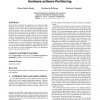Free Online Productivity Tools
i2Speak
i2Symbol
i2OCR
iTex2Img
iWeb2Print
iWeb2Shot
i2Type
iPdf2Split
iPdf2Merge
i2Bopomofo
i2Arabic
i2Style
i2Image
i2PDF
iLatex2Rtf
Sci2ools
101
click to vote
GECCO
2006
Springer
2006
Springer
A dynamically constrained genetic algorithm for hardware-software partitioning
In this article, we describe the application of an enhanced genetic algorithm to the problem of hardware-software codesign. Starting from a source code written in a high-level language our algorithm determines, using a dynamically-weighted fitness function, the most interesting code parts of the program to be implemented in hardware, given a limited amount of resources, in order to achieve the greatest overall execution speedup. The novelty of our approach resides in the tremendous reduction of the search space obtained by specific optimizations passes that are conducted on each generation. Moreover, by considering different granularities during the evolution process, very fast and effective convergence (in the order of a few seconds) can thus be attained. The partitioning obtained can then be used to build the different functional units of a processor well suited for a large customization, thanks to its architecture that uses only one instruction, Move Categories and Subject Descript...
Enhanced Genetic Algorithm | GECCO 2006 | Genetic Algorithm | Optimization | Overall Execution Speedup |
Related Content
| Added | 23 Aug 2010 |
| Updated | 23 Aug 2010 |
| Type | Conference |
| Year | 2006 |
| Where | GECCO |
| Authors | Pierre-André Mudry, Guillaume Zufferey, Gianluca Tempesti |
Comments (0)

